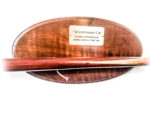 Legends are born in events that we rarely take personal part in. Actions that transcend ordinary lives always seem to occur when we’re not there to see. Those near enough to bear witness later share their tale with a circle of friends, and eventually the word reaches our ears. This is such a tale.
Legends are born in events that we rarely take personal part in. Actions that transcend ordinary lives always seem to occur when we’re not there to see. Those near enough to bear witness later share their tale with a circle of friends, and eventually the word reaches our ears. This is such a tale.
There used to be a cafe in the old red brick building that once housed the Castleman Coach Seat factory overlooking the Black Sand River. The river originally powered the factory through a system of leather flatbelts, driven by wooden pulleys on shafts mounted near the ceiling. Some of that system was still in place when this happened. Of course, the entire building is gone now.
The cafe was the haunt of a motorcycle gang. It wasn’t what the owner of the cafe really wanted, it’s just the way it was. This was back when motorcycle gangs were populated with guys, mostly, who didn’t really do much besides ride and hang out. There were women as well, and they, too, centered their lives around riding and belonging to the gang. Today, you’ll see motorcycle clubs riding bikes that cost as much as houses, wearing designer leathers that show creases from being folded carefully into boutique boxes before leaving the store. These people have jobs and families and lives beyond their bikes
The Black Sand gang members were authentic without that being a choice. They wore dirty jeans, torn colors and leather jackets older than the wearers themselves. There was a smell about these guys, and a definite air of threat. There was a pool table in the cafe.
Time passed, and as expected in a story such as this, an outsider arrived to change the balance of things. Late on an overcast Thursday afternoon, a man with a brown suit and polished shoes walked in. No one could know it at the time, but he was a con man, posing as a real estate developer with inside information that a new highway interchange would be built soon, and the town of Black Sand would suddenly become a commercial hub.
“My name is Brown”, he announced. “I’d like to speak with the owner of this property”.
The real owner rarely came in, and was absent that day as well. His only employee was the red faced man tending bar, pouring himself a drink with every second or third drink he served. The owner and bartender both avoided antagonizing the gang.
The gang’s leader approached Brown, leading with his chest and chin. “I am”, he lied. “Who wants to know?”
To shorten the story, by the time it was dark, Brown and the leader, who falsely gave his name as ‘King’, had developed a professional relationship, equals in ethics and avarice. Each knew the other was up to something, but neither would show his hand. Building upon this infirm ground, they soon found themselves negotiating the possibility of a real estate transaction. Brown produced an envelope he claimed held ‘earnest money’, and in the shifting logic of midnight whiskey, guided by a clever con man, a game of pool was begun to demonstrate the good faith of everyone involved.
Those who were there to bear witness differ in telling what happened, but Mr. Brown quickly called out Mr. King for using the table’s loose leg to gain unfair advantage. King got off the first shot, but Brown’s volley magically went right through a gas pipe and into the boiler. The flames were visible for miles, and old man Castleman’s legacy crumbled at last into the river.
The red faced man pulled the Sportsmanship Cue from the river two days later, just as you see it now, burnt and with a nail driven into it by the force of the blast. He gave up his drinking after that, and replaced it with a sense of irony, as evidenced by the plaque upon which he mounted the cue.